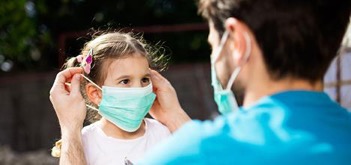We are being discouraged to purchase surgery masks and N95 masks to ensure that medical staff are getting enough protective gear when treating coronavirus patients. Although homemade face masks won’t provide similar levels of protection against COVID-19, it still helps to slow down and reverse the outbreak. It is recommended that everyone, aside from babies and toddlers, and those who find it difficult to wear face coverings, should now wear protective face masks anytime they are in public spaces. But how do you explain to your child that they need to wear a face mask every time they leave the house? This can be a very confusing time for children and it’s our jobs, as parents, to provide them with as much information as possible to help ease their anxiety and help them to understand just what is going on and why they are seeing people wearing all of those odd-looking face masks in public.
How To Explain To Your Child The Need For Personal Protective Masks
Governments around the world are recommending people wear cloth masks whenever they go out in public. Along with physical distancing, frequent hand washing and other preventive measures, the risk of COVID-19 infection will be much lower. Because a large number of people don’t exhibit symptoms (asymptomatic) or don’t develop symptoms yet (pre-symptomatic), it is crucial for everyone to continue their preventative measures. Although asymptomatic and pre-symptomatic individuals don’t sneeze or cough, small droplets could still disperse when speaking. When people are talking in close proximity, the risk of COVID-19 infection can be high.
It is recommended to wear a three-layered cloth face mask, preferably with one waterproof layer. Cloth masks can’t stop virus from reaching the nose and mouth of the wearer. However, droplets won’t directly contact the wearer, significantly reducing the risk of infection.
Despite its limited level of protection in high risk situations, here are reasons why you should continue wearing a cloth mask:
You Help The Healthcare Sector- if people don’t wear masks, the rate of infection will be much higher. This may overwhelm the healthcare sector, because thousands of people will need immediate treatments after showing severe symptoms.
You Won’t Touch Your Face- during daily activities, you could touch objects in public spaces. It is debatable how long COVID-19 virus could survive on inanimate objects. If you touch your eyes, nose and mouth with contaminated hands, the risk of infection is quite high.
It Acts As A Physical Barrier- it’s still better to have a physical barrier to protect your nose and mouth against droplets. The most common way for viruses to spread is through sneezing and coughing. Without a face mask, you will receive a full blast of nasal or oral discharge without realising it. If someone nearby is sneezing, a cloth face mask could significantly reduce your child’s exposure.
Contact EduCare Nurseries
To learn more ways to keep your children healthy and active during the coronavirus pandemic, contact EduCare Nurseries today and speak with a childcare professional about the exclusive EduCare day childcare nursery experience.
If you enjoyed this article, please feel free to share it on your favourite social media sites.



